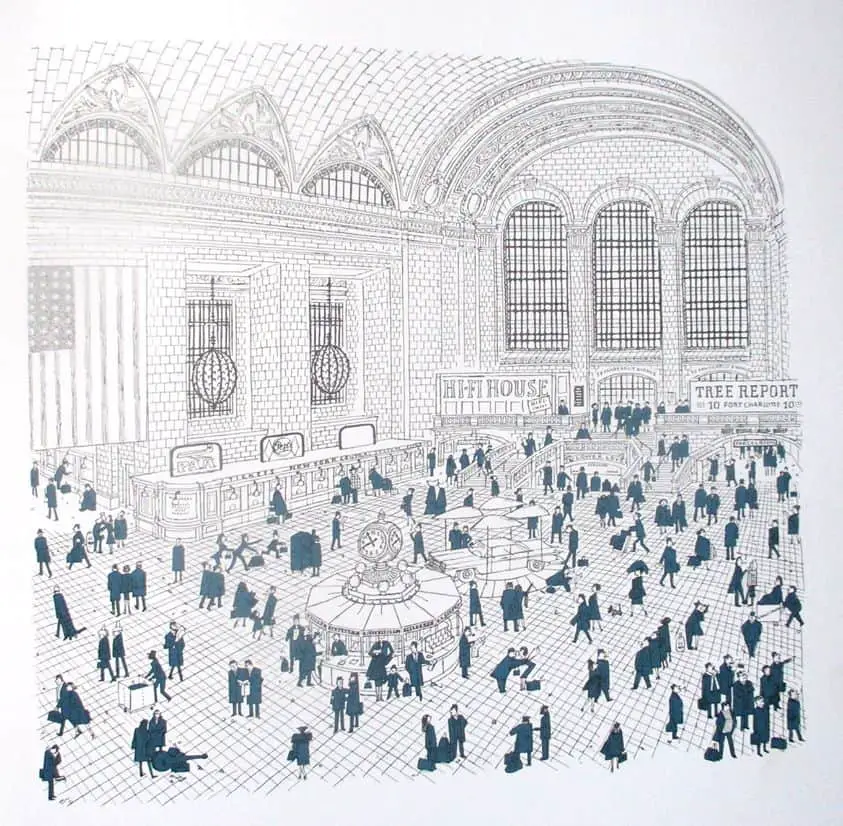“Reunion” is a short story by John Cheever, first published 1962 in The New Yorker. You can listen to it read by Richard Ford.
SETTING OF REUNION
As Richard Ford says, Grand Central Station is a place where anything could happen — any two people could meet.
The story is set in the 1950s or 60s, the heyday of ‘the perfect nuclear family’. It was a big deal back then not to have a father. Divorce was rare. Women were not financially supported. It is highly probable the boy was the only child in his class without a father at home. This would add to the pain of missing him.
COMPACT STORY FORM
“Reunion” is a compact short story of around 1000 words. Most of Cheever’s stories are much longer than this one. The reader deduces a lot:
- The father has probably been kicked out of ‘the club’ and couldn’t take his son there even if he wanted to.
- His terrible personality is the reason the narrator’s mother divorced him in the first place.
- The father is showing off to the son, probably more than he usually does, because of the limited time he has with his boy.
- He has a white collar job, and no doubt treats his co-workers and secretary in the same way. I’m imagining he works on Madison Avenue, in the Mad Men world.
- I imagine the father has some kind of personality disorder which gives him the ability to turn off empathy at will.
Cheever partly achieves compactness by:
- Telling rather than always showing. The first paragraph is an excellent example of that.
- Omitting the narrator’s reactions, focusing only on the father’s mesmerising horribleness. We only get the narrator’s reaction in the final sentence when it becomes clear he has decided not to see his father again (perhaps only later, after processing events).

WHAT HAPPENS IN “REUNION”
A son looks forward to seeing his father for the first time in three years, but when they meet he witnesses how his father treats others, and comes to the realisation that he is a terrible person.
STORY STRUCTURE OF “REUNION”
SHORTCOMING
This story is an example of a viewpoint character as first person narrator. The main character of this story is the father. The narrator is the Every Boy, who looks up to his father. However, you could equally argue the ‘main character’ status is shared, because it’s the child who has the anagnorisis at the end. This is why the concept of ‘main character’ is problematic.
The shortcoming of the narrator is that he is a child. He can’t choose his father. By the father’s absence, the narrator has been idolising an image of his father who was never real.
The shortcoming of the father is huge. He has no empathy for other people, does not respect rules, and is trying to get his son to join him in his assholery.
DESIRE
The narrator wants to enjoy some time with his father. As a child, he is automatically predisposed to giving him respect.
The father wants to show his son how to be a man. Perhaps because he senses he has limited time in which to do so, he goes over the top in his dick-waving oneupmanship, and is terrible to everyone he meets.
OPPONENT
Father and son start off as allies and switch over to opponents at some point in the story.
PLAN
The plan comes from the opponent — the father plans to take his son out to eat, and to impress him with his wit.
BIG STRUGGLE
Every encounter in this story is a minor big struggle. Unlike in, say, a classic mythical structure, these big struggles don’t escalate. I mean, the big struggles don’t get worse. Each person reacts in basically the same way — avoidantly. But it is the cumulation of behaviours which make it seem to the son, and to us, like the big struggle is getting worse and worse.
ANAGNORISIS
There is no exact point when the son realises his father is terrible — rather, it’s a cumulation of things. Perhaps he could’ve forgiven his father if he was rude once. But Cheever gives us more than enough incidents to make the father’s terrible behaviour a pattern.
It is revealed why the father behaves the way he does right at the end, when the father says, “I want to get a rise out of this chap.” He’s using these people as playthings.
NEW SITUATION
“Goodbye, Daddy,” I said, and I went down the stairs and got my train, and that was the last time I saw my father.
COMPARE AND CONTRAST
Another short story that would be appreciated by high school aged boys especially:
The Hoaxer by Walter Kirn. “The Hoaxer” is published in 12 Short Stories and Their Making, edited by Paul Mandelbaum. This book includes an interview with Walter Kirn about why he wrote this story.
Download a compare and contrast juxtaposing Cheever’s and Kirn’s short stories about father and son.
Richard Ford wrote a short story in homage to Cheever’s, also called Reunion. Read them side by side for a case study in how a favourite short story can inspire your own creation.
WRITE YOUR OWN
- What have you learnt about the adults in your life since you were a child?
- Was there a moment when your parent’s humanity became apparent to you?
- Are there members of your family and extended family who embarrass you? Why? Do you agree with the way your adults treat other people?
- Who are you most similar to in your family? Whose does your public behaviour most resemble? What about your behaviour in private, within the family?
- What, if anything, would you change about an important adult in your life?

